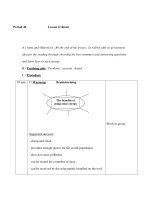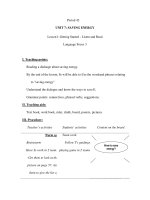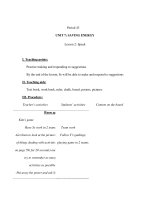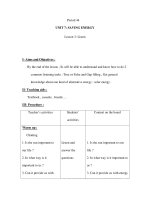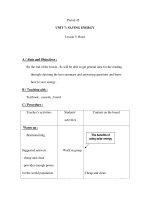UNIT 7 SAVING ENERGY LESSON 5
Bạn đang xem bản rút gọn của tài liệu. Xem và tải ngay bản đầy đủ của tài liệu tại đây (38.61 KB, 3 trang )
<span class='text_page_counter'>(1)</span><div class='page_container' data-page=1>
UNIT 7: SAVING ENERGY
<i><b>LESSON 6: LANGUAGE FOCUS</b></i>
<b>Aims: To give the students main structures of the unit.</b>
<b>Objectives: By the end of the lesson the students will be able to get and use the structures. </b>
<b>Skills: Reading, speaking, writing</b>
<b>Teaching aids: poster, cues, book.</b>
Languages:
<b>Grammar: Connectives, phrasal verbs, making suggestion</b>
<b>Vocabulary: </b>
<b>TIME</b> <b>PROCEDURE</b> <b>T’S ACTIVITIES</b> <b>STS’ ACTIVITIES</b>
4’ <i><b>I.</b></i>Suggest turn on turn off sometimes<i><b>WARMER: Slap The Board</b></i>
Movies faucet clean TV
- Controls the game - Play game
20’
<i><b>II.</b></i> <i><b>PRESENTATION:</b></i>
<i><b>1.</b></i> <b>Connectives :</b>
- To connect two simple sentences.
- Some common connectives:
+ And: connect two equal sentences or
things. Their meanings don’t conflict each
other.
+ But: connect two equal sentences or
things. Their meanings conflict each other.
+ Because: connect the main clause with the
subordinate clause of reason.
+ Or: used when there is choice between
two things.
+ So: begin for the adverb clause of reason.
After a comma.
+ Therefore: at the beginning of a
conclusion sentence.
+ However: at the beginning of a sentence.
To express one’s trying.
<i><b>2.</b></i> <b>Phrasal verbs:</b>
- There are two kinds of phrasal verbs. One
we can guess the meaning of the verb, the
other we can’t.
<b>Ex: to turn on ; to turn off</b>
<b>V + prep</b>
<i><b>3.</b></i> <b>Making suggestions :</b>
<b>a.</b> To give idea in order to ask the other to do
something with you.
- Gives model
sentences.
- Explains
- Gives form and
usages.
- Listen and take notes
Period: 49
</div>
<span class='text_page_counter'>(2)</span><div class='page_container' data-page=2>
<b>Ex: I suggest doing the exercise before going to </b>
school.
<b>S + suggest + V-ing ……..</b>
<b>b.</b> To give advice to the other.
<b>Ex: I suggest that he should take that pill.</b>
<b>S + suggest + (that) + S + should + V1 ………..</b>
15’ <i><b>III.</b></i> <i><b>PRACTICE:</b></i>
<i><b>Team competition:</b></i>
Do the exercises in the book.
<b>1. Exercise 1: page 62</b>
<b>Key:</b>
a. and
b. but
c. because
d. therefore
e. or
f. so
g. and
h. however
<b>2. Exercise 2 : page 63</b>
<b>Key:</b>
a. look after
b. go on
c. turn on
d. looked for
e. turn off.
<b>3. Exercise 3 : page 64</b>
<b>a. Using “S + suggest + V</b>-ing ……..” to make
<b>Suggestions:</b>
I suggest collecting unused clothes.
I suggest organizing a show to raise
money.
I suggest giving lessons to poor
children.
I suggest help elderly people and
war invalids with their chores.
<b>b. Using “S + suggest + (that) + S + should + </b>
V1 ………..” to make suggestions:
I suggest that you should write
sentences with new words.
I suggest that you should speak
English in class.
I suggest that you should buy a good
dictionary.
- Gives time for the
students to practice the
structures by doing the
exercises.
</div>
<span class='text_page_counter'>(3)</span><div class='page_container' data-page=3>
I suggest that you should do some
reading every day.
5’
<i><b>IV.</b></i> <i><b>POST-TASK:</b></i>
<b>Pyramid</b>
Each student writes a suggestion.
Exchange with the others.
- Asks students write
sentences and then
exchange with others.
- Write sentences and
then exchanges with
others.
<i><b>V.</b></i> <i><b>HOMEWORK:</b></i>
- Learn the lesson carefully.
- Finish the exercises in your book.
- Gives home
assignment - Take notes
<b>Notes :</b>
</div>
<!--links-->




